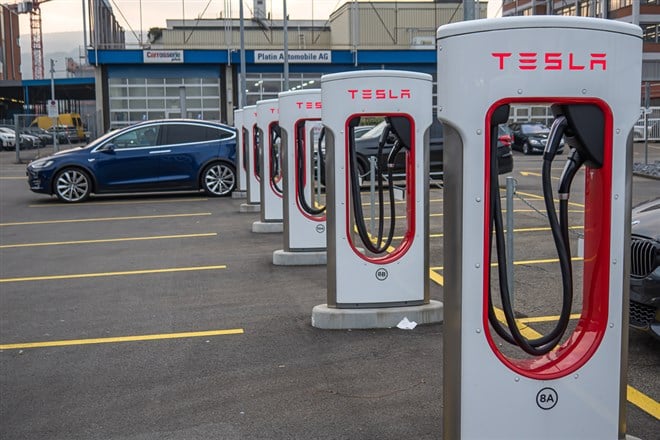Why Does Tesla Stock Remain Resilient? Tesla's stock continues to defy the broader market trend and remains resilient despite a few hiccups. It remains to be seen how it will do in the future.
By Parth Pala
Our biggest sale — Get unlimited access to Entrepreneur.com at an unbeatable price. Use code SAVE50 at checkout.*
Claim Offer*Offer only available to new subscribers
This story originally appeared on MarketBeat

- Amidst a sell-off, Tesla remains poised to see significant gains.
- Ford has raised prices to offset rising material costs, will Tesla?
- The short ratio of Tesla continues to be optimistically healthy, indicating a future upswing.

Tesla (NASDAQ: TSLA) continues to remain resilient despite the broader market sell-off, despite predictions of demise by short-shellers. And despite these predictions, the stock is up 16% for the year and continues to trade at relatively lofty valuations. The stock was down 4% during early trading hours on Friday.
Sales Should Be Back On Track Next Quarter
Tesla should see significant gains in the latest quarter, with August sales estimated to be over 100 percent YoY, and with China sales expected to be around 77,000 vehicles in August, things seem to be back on track after a small hiccup in the previous quarter. Meanwhile, Tesla is expected to have doubled its market share in the US to 4%, with sales doubling for the month as well YoY. Tesla, in general, has seen strong uptake in many countries, including the likes of Australia, although results in Europe have been mixed. Should the next quarter's results come in strong again, Tesla could see its stock rise once again, going against the general trend of tech stocks.
Valuations have broadly retreated in the tech sector, with many companies down over 50%, but Tesla remains one of the few companies that have triple-digit valuations still; with the current price-to-earnings still over 100, many remain skeptical still. But, considering that Tesla's growth continues to remain very high, and there seems to be little let up in terms of momentum, valuations may not be that expensive. Especially considering margins have also remained sustainable until now, the next couple of quarters will set the tone for where the price heads.
Meanwhile, Ford recently announced that it was raising prices in order to overcome the rise in the price of parts, which have gone up anywhere from 7 to 20 percent. On the other hand, Ford projects increasing production by 10%, going against the narrative that sales are about to turn for the worse. It remains to be seen whether Tesla will follow suit with price rises, as the price of inputs such as Lithium continues to rise as well. Tesla, in previous years, has raised prices on some of its models and may do again. The previous price rises did not affect Tesla's sales, but continued increases may start to finally hamper the company.
Tesla has been facing an onslaught of competition from multiple companies, and many new electric vehicles are set to hit the market this year. Short-sellers have pointed out that competition is slowly taking over Tesla, with numerous companies proving to have better mileage, and others who have similar attributes but lower prices. Regardless, the brand value and the brand loyalty towards Tesla seem to have qualities that have kept the competition at bay for now. While in places like Europe, competition has done better, in North America, China, and Australia/New Zealand, Tesla continues to be at the top.
Should Tesla continue to see the strong run of form that it has in recent times, the forward price-to-earnings will fall to 52, and many may consider that not very expensive. Margins aside, debt remains relatively manageable at $6.66 billion, and with cash currently standing at $18 billion, the company remains well capitalized to overcome the increasing rate environment. Tesla levered free cash flow currently stands at $6 billion.
The company's short ratio remains relatively healthy as well, standing at 2.3%, and the put-call ratio remains around 1, indicating that investors remain relatively neutral on the fortunes of the stock. Considering Tesla, until now, has managed to overcome a lot of the criticism, there is less of an impetus to be overly bearish on the company. Tesla has had a few problems as well, including the self-driving program, which has not lived up to expectations, but clearly, that is now what is driving customers to the vehicle. Brand loyalty has almost an "iPhone' feel to it, but in a few more years, it will become more obvious whether or not the stickiness can remain.
The stock currently is not witnessing a major correction, and despite the broader market retreating, Tesla continues to remain resilient. Rates will continue to rise for a few more quarters, which should push discount rates higher, but considering the rate at which earnings continue to grow, it may not matter. Tesla could be in bubble territory, or it could be the start of a multi-year stock run for a stock that has already seen its price increase significantly.
Tesla is a part of the Entrepreneur Index, which tracks some of the largest publicly traded companies founded and run by entrepreneurs.










